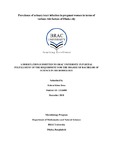Prevalence of urinary tract infection in pregnant women in terms of various risk factors of Dhaka city

View/
Date
2018-12Publisher
BRAC UniversityAuthor
Ema, Eshrat IslamMetadata
Show full item recordAbstract
Urinary tract infections (UTI) are the most common bacterial infections during pregnancy. Untreated UTI can be associated with serious obstetric complications. This study was done to determine the prevalence of UTI among pregnant women attending in Maternal Hospital and Child Health Institute, Azimpur, Dhaka and to help the prevent complications of UTI. This study represents a cross-sectional study carried over a period of three months with a total of 214 pregnant women. Out of 214 pregnant women 83 (39%) were found to have UTI. In this study, some demographic characteristics of the total 214 pregnant women were studied. For example age range of getting pregnant, blood group, Patient’s professions, weight data etc. Interestingly it was observed that our female education is still unsatisfactory. About 13% of the total pregnant women were illiterate and only 2% of were graduate. The within the women age group 21-25 years had the highest incidence of infection (64%). Multiple reasons are associated with increased urinary tract infection in pregnancy. The results underscore the importance of screening all pregnant women for significant bacteriuria since UTI is the most common bacterial infection during pregnancy. Hence, positive cases should be treated subsequently with antibiotics in order to reduce the adverse effects on both maternal and fetal health. There was the higher rate of infection in the third trimester 52 (63%) compared to second trimester 31(37 %) and 1st trimester 0.46%. This study also shows that 49 (59%) of women who had UTI were in their 2nd pregnancy compared to that of 3rd 10 (12%) pregnancy. The study also focused that past Caesarean delivery patients had a 43% higher rate of urinary tract infection than normal past delivery patients 29%. From the analysis, it was found that the antibiotic prescribed to pregnant women for UTI was not different to the prescribed to normal UTI patients. From another cross analysis between UTI and Non-UTI pregnant patients, both groups had a gastric problem with almost equal frequency. In this study, it was focused that the patients who did intercourse had more chances of UTI problem during pregnancy.
